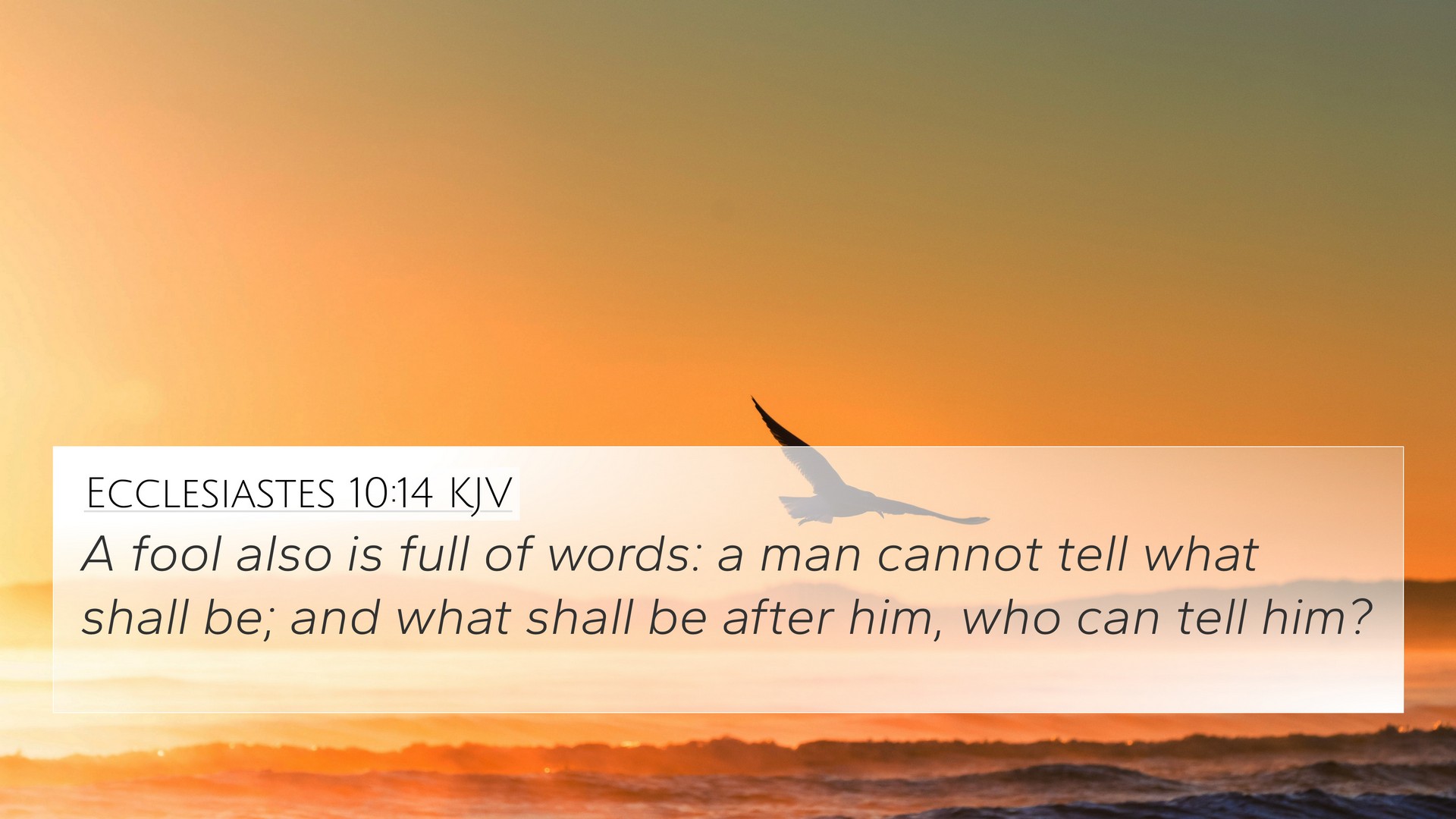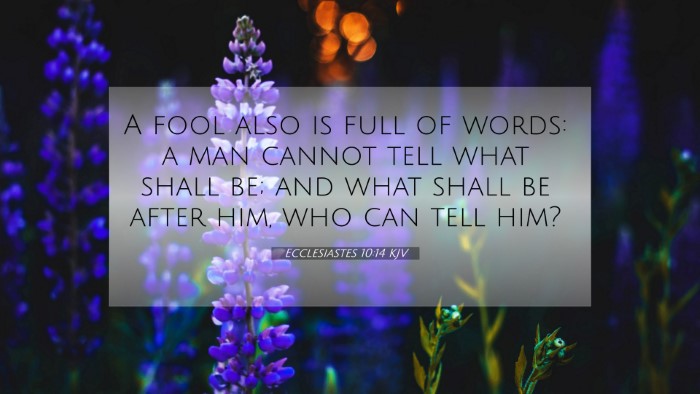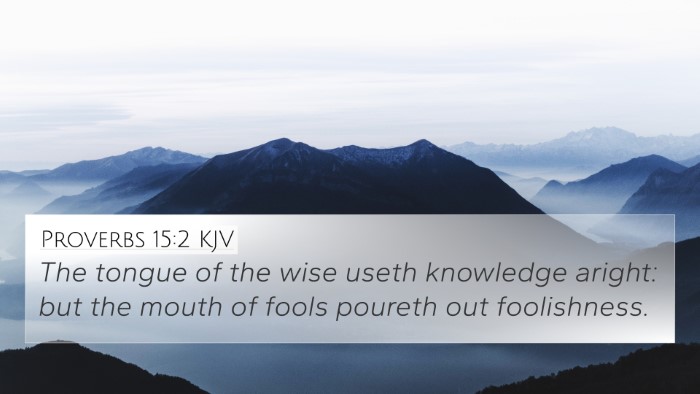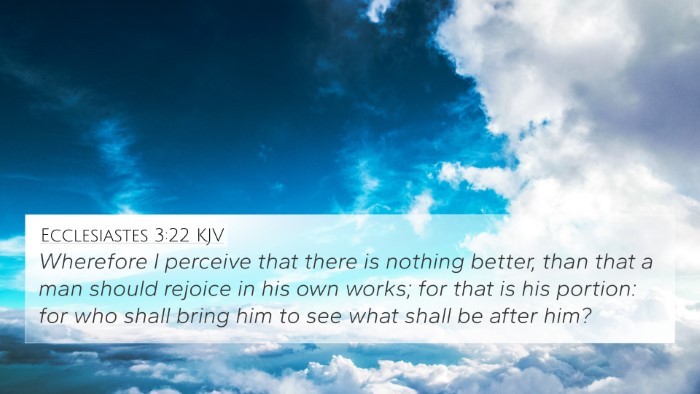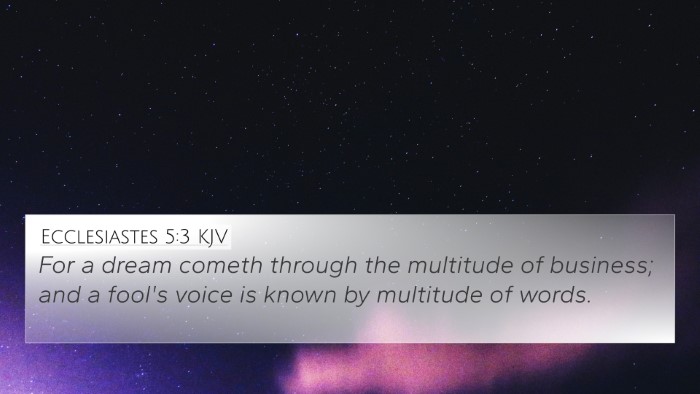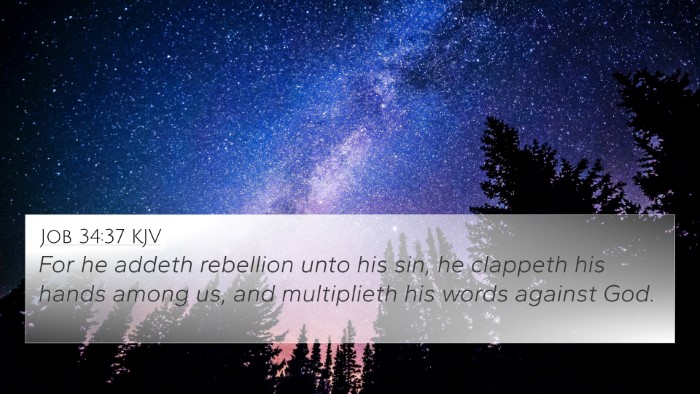Ecclesiastes 10:14 - Verse Meaning and Interpretation
Ecclesiastes 10:14 states: "A fool also multiplieth words: a man cannot tell what shall be; and what shall be after him, who can tell him?" This verse highlights the futility and noise of foolish speech in contrast to the wisdom found in silence.
Summary of Insights from Public Domain Commentaries
The combined insights from Matthew Henry, Albert Barnes, and Adam Clarke provide a rich understanding of this verse.
-
Matthew Henry:
Matthew Henry emphasizes the nature of the fool, who speaks without understanding and rambles excessively. He asserts that such individuals often lack comprehension of the future and what lies beyond their grasp, illustrating the peril of speaking without insight.
-
Albert Barnes:
Albert Barnes focuses on the contrast between wise and foolish speech. He notes that fools tend to speak more than necessary, implying that wisdom often listens more than talks. His commentary calls attention to the uncertainty of life, suggesting that no one can foresee what will come next or what the future holds.
-
Adam Clarke:
Adam Clarke elaborates on the idea of the fool being too verbose, indicating that true knowledge involves recognizing one’s limitations. He points out that those who understand their ignorance tend to speak less, while the foolish are often the most loquacious.
Thematic Bible Verse Connections
This verse can be connected to several key themes in scripture, reflecting the contrast between wisdom and folly, and the value of prudent speech.
- Proverbs 10:19: "In the multitude of words there wanteth not sin: but he that refraineth his lips is wise."
- Proverbs 18:2: "A fool hath no delight in understanding, but that his heart may discover itself."
- James 1:19: "Wherefore, my beloved brethren, let every man be swift to hear, slow to speak, slow to wrath."
- Proverbs 29:11: "A fool uttereth all his mind: but a wise man keepeth it in till afterwards."
- Ecclesiastes 5:3: "For a dream cometh through the multitude of business; and a fool’s voice is known by multitude of words."
- Proverbs 17:27: "He that hath knowledge spareth his words: and a man of understanding is of an excellent spirit."
- Ecclesiastes 3:7: "A time to rend, and a time to sew; a time to keep silence, and a time to speak."
Inter-Biblical Dialogue and Analysis
Ecclesiastes 10:14 serves as a poignant reminder of the nature of communication and the wisdom of restraint, which is echoed throughout both the Old and New Testaments. The interplay of these verses reveals deeper insights into the biblical perspective on speech.
This scripture encourages readers to consider the implications of their words and the importance of knowing when to speak and when to remain silent. The repetitive theme of folly found in multiple scriptural contexts strengthens our understanding of a true biblical wisdom that values discernment.
Tools for Bible Cross-Referencing
When studying this verse, utilizing a Bible Concordance can significantly enhance understanding. Consider exploring:
- Bible Cross-Reference Guide: Useful for pinpointing related themes or verses.
- Cross-Reference Bible Study: Methods to engage with interconnected scriptural themes.
- Bible Reference Resources: Access materials that help clarify the relationship between verses.
- Bible Chain References: Systems that link verses based on thematic connections.
- Comprehensive Bible Cross-Reference Materials: Publications that provide extensive references and explanations.
FAQs on Cross-Referencing Ecclesiastes 10:14
What verses are related to Ecclesiastes 10:14?
The connections are rich within scripture, including verses that expound the themes of wisdom and foolishness.
How to find cross-references in the Bible?
Look for key themes or phrases in your verse, and utilize tools like a Bible concordance or cross-reference guide.
How do Ecclesiastes 10:14 and Proverbs 10:19 connect?
Both highlight the importance of wise speech and the dangers of excessive wordiness, indicating that prudence is often found in silence.
In summary, Ecclesiastes 10:14 encapsulates the folly of excessive speech and reflects on the uncertainty of future events, encouraging readers to value wise discretion in their discourse.
